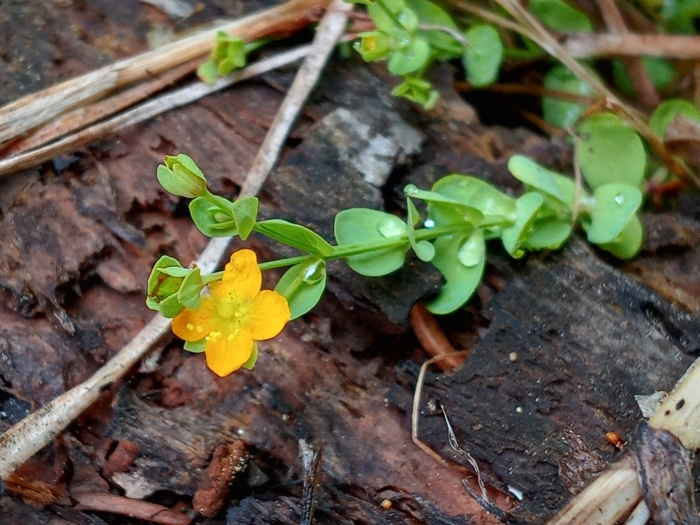Creeping St. John’s-Wort
(Hypericum anagalloides)
Creeping St. John’s-Wort (Hypericum anagalloides)
/
/

Daniel S.
CC BY 4.0
Image By:
Daniel S.
Recorded By:
Copyright:
CC BY 4.0
Copyright Notice:
Photo by: Daniel S. | License Type: CC BY 4.0 | License URL: http://creativecommons.org/licenses/by/4.0/ | Rights Holder: Daniel S. | Publisher: iNaturalist | Date Created: 2021-07-29T13:02:10-07:00 |


















Estimated Native Range
Summary
Hypericum anagalloides, commonly known as creeping St. John’s-wort or tinker’s penny, is a stoloniferous annual or perennial herb. It is native to moist habitats in western North America, including British Columbia, Washington, Oregon, California, and Nevada, where it is often found in wet meadows, marshy areas, and along streambanks. This plant typically forms dense, low-growing mats up to 10 inches in length. The stems either lie flat on the ground or rise slightly at the ends, and they are adorned with round or oval, gland-dotted green leaves. The bright golden yellow flowers, which bloom from late spring to mid-summer, are quite showy and can grow singly or in clusters. Each flower features five oval-shaped petals and numerous stamens with yellow or white anthers, creating a striking contrast.
Creeping St. John’s-wort is valued for its ability to form attractive ground cover in wet areas and is often used in water gardens, bog gardens, and around ponds. It is relatively easy to maintain, requiring consistently moist soil and full sun to part shade conditions. While it is not typically prone to serious disease or pest problems, it can be sensitive to drought and may require additional watering during dry periods. This plant can spread readily by stolons, making it useful for erosion control but also potentially aggressive in favorable conditions.CC BY-SA 4.0
Creeping St. John’s-wort is valued for its ability to form attractive ground cover in wet areas and is often used in water gardens, bog gardens, and around ponds. It is relatively easy to maintain, requiring consistently moist soil and full sun to part shade conditions. While it is not typically prone to serious disease or pest problems, it can be sensitive to drought and may require additional watering during dry periods. This plant can spread readily by stolons, making it useful for erosion control but also potentially aggressive in favorable conditions.CC BY-SA 4.0
Plant Description
- Plant Type: Herb
- Height: 0.5-1.5 feet
- Width: 0.5-1 feet
- Growth Rate: Moderate
- Flower Color: Yellow
- Flowering Season: Spring, Summer, Fall
- Leaf Retention: Deciduous
Growth Requirements
- Sun: Full Sun, Part Shade
- Water: High
- Drainage: Medium, Slow
Common Uses
Bee Garden, Low Maintenance, Water Garden
Natural Habitat
native to moist habitats in western North America, including British Columbia, Washington, Oregon, California, and Nevada, where it is often found in wet meadows, marshy areas, and along streambanks
Other Names
Common Names: Marsh St. John’s-Wort, Bog St. John’s-Wort, Creeping St. John’s-Wort
Scientific Names: , Hypericum anagalloides, Hypericum anagalloides var. anagalloides, Hypericum anagalloides var. calicifolium, Hypericum anagalloides var. cymosum, Hypericum anagalloides var. nevadense, Hypericum anagalloides var. pumilum, Hypericum anagalloides var. ramigerum, Hypericum anagalloides var. undulatum, Hypericum bryophytum
GBIF Accepted Name: